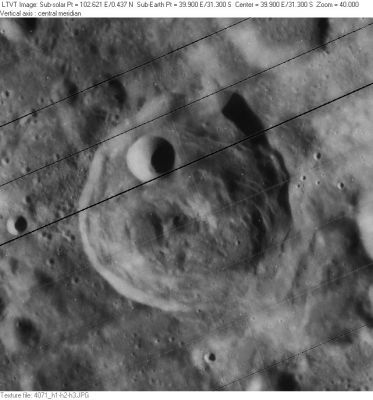Neander
Contents
[hide]Neander
|
Lat: 31.3°S, Long: 39.9°E, Diam: 50 km, Depth: 3.4 km, Rükl: 68 |
LO-IV-071H The 11-km crater on the northern floor of Neander is Neander A. 25-km Neander E is partially visible along the upper right margin.
Images
LPOD Photo Gallery Lunar Orbiter Images Apollo Images
Maps
(LAC zone 97D3) LAC map Geologic map
Description
Description: Elger
(IAU Directions) NEANDER.--This ring-plain, 34 miles in diameter, a short distance E.S.E. of Piccolomini, has a somewhat deformed rampart, which, however, except on the N., where there is a narrow gap occupied by a small crater, is continuous. It rises on the W. nearly 8,000 feet above the floor, on which there is a central mountain about 2,500 feet high. Schmidt shows some minor hills, a large crater on the N.W. side, and three smaller craters in the interior.
Description: Wikipedia
Additional Information
Depth data from Kurt Fisher database
- Westfall, 2000: 3.4 km
- Viscardy, 1985: 3.4 km
- Cherrington, 1969: 3.01 km
- Satellite crater Neander N is on the ALPO list of bright ray craters.
- Curious fault to the east-southeast of Neander (at 33° South/ 44° East). This fault was photographed by Howard Eskildsen during local pre-sunset illumination (evening terminator circumstances), see LPOD April 5 2013.
Nomenclature
Neumann, Michael; German mathematician (1529-1581).
- According to Whitaker (p. 213) this is identical to the name introduced by Riccioli, and has continued unchanged.
Neander Fault
- The Neander Fault is an unofficial name for the curious fault at 33° South/ 44° East (to the east-southeast of Neander). This unofficial name is included on chart 6 (page 25) in the 21st Century Atlas of the Moon (C.A.Wood/ M.J.S.Collins).
LPOD Articles
A Third Gander at Neander
Don't give me any of your lip (sunset at the Neander Fault).
Bibliography
A Portfolio of Lunar Drawings (Harold Hill), page 238 (the Neander-Reichenbach-Rheita region at sunset).
